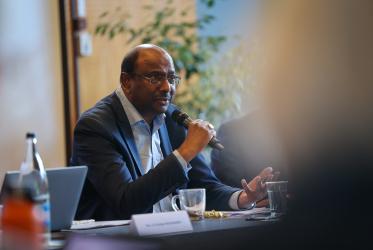The first speaker, Bishop Dr Brian Farrell, secretary of the Pontifical Council for Promoting Christian Unity, reflected that we all know divisions between churches have existed since the beginning.
“What is new in this era of ecumenical relations is the fact that the churches themselves are now systematically talking to each other about Christian unity,” he said. “Bilateral dialogue is no longer a question of individuals interested to get together and talk—it is an activity of the churches themselves.”
The webinar drew on the profound experience of those involved in bilateral dialogues, who shared their processes, methodologies, results, and reception. Speakers also fielded questions on emerging issues and trends.
Rev. Dr Odair Pedroso Mateus, WCC interim deputy general secretary and director of the WCC Commission on Faith and Order, focused on the emergence and development, especially in the 1960s and 1970s, of bilateral dialogues. “I would invite you to travel back to the 60s, more precisely in the middle half of the 60s when the Catholic Church embraces the ecumenical movement,” he said, referring among other events to the WCC Assembly in 1961, held in New Delhi, India.
The WCC—especially its Commission on Faith and Order—promotes multilateral dialogue, he added. Its vision of unity expressed itself in a model known traditionally as an organic union.” Bilateral dialogues would emphasize a different model of union known as mutual recognition in reconciled diversity.
Archbishop Prof. Dr Job of Telmessos, permanent representative of the Ecumenical Patriarchate to the WCC, reflected that the Orthodox Church was a founder in terms of both the ecumenical movement and the many bilateral and multilateral dialogues that were developed within the ecumenical movement.
“This involvement of the Orthodox Church goes back to the beginning of the 20th century,” he said. “Already this question was raised in 1902,” he said, referring then to related encyclicals from the Ecumenical Patriarchate in the early 1900s.
“Since then, the Orthodox churches participated in all the meetings of the ecumenical movement, and in the conferences of Faith and Order, and also the conferences of practical Christianity, and during these conferences they met with other Christians, and this is how the different dialogues began,” he said.
Rev. Dr Miriam Haar, from the Institute for Ecumenical Studies and Research in Bensheim, Germany, who moderated the discussion, brought forth a current issue raised by participants. "There’s the experience in many parts of the world that very important bilateral dialogues and their outcomes are received very poorly at the local level,” she said. At the same time, she added, in other areas of the world people at the local level are in fact leading bilateral dialogues.
“I would like to mention both of these experiences,” she said, as she invited people to attend the remainder of the series. “I would like to encourage you to continue this ecumenical discussion,” she concluded.








